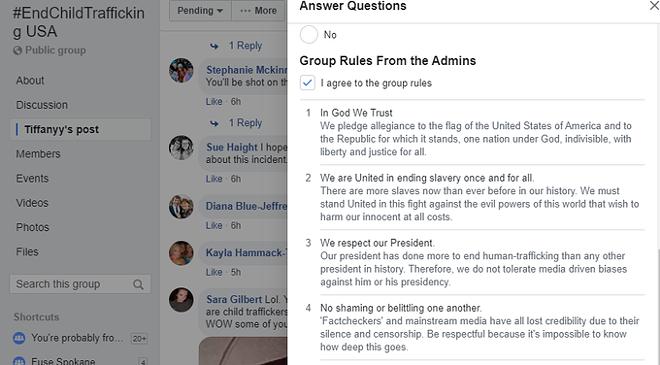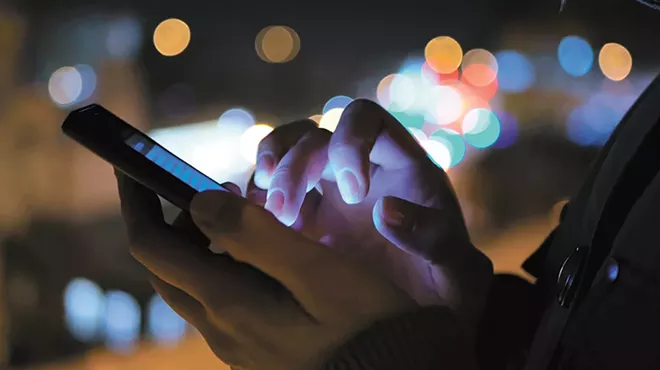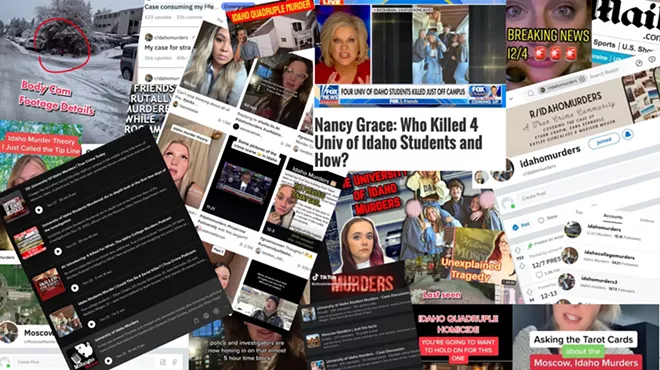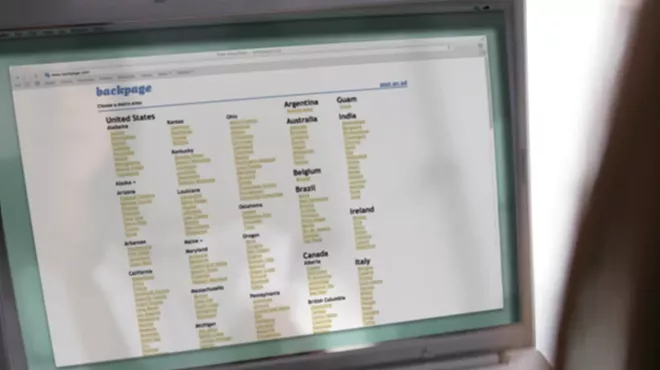
A pamphlet left in a car door handle is not normally a reason you call the cops — particularly before you see what's on the pamphlet. But perception is everything.
And so when Alexus Nekich, a local makeup artist, saw that a brochure of some sort had been stuck in her door handle in the parking lot of the Spokane Valley Best Buy last Saturday, she thought back to the warnings she'd seen circulate throughout social media sites.
"There was this thing that went viral on the news and on TikTok, I think, about how people are leaving fake pamphlets and fake tickets on your windshield," Nekich recounted on a recent Instagram video, "And then when you grab it, they kidnap you. Or they have been using people for sex trafficking, and that's their technique for grabbing people."
And so when she saw a pamphlet on her car door handle — a bizarre Jack Chick religious tract — she says she freaked out, called Crime Check and told them she didn't feel safe.
"'I need someone here right now,'" she recounts telling Crime Check. "'I don't know if they're in the store with me. I don't know if they're watching me.' ... We're waiting in the store and I'm trying not to cry."
She says sheriff's deputies — including a SWAT officer and an officer with a K-9 dog —showed up and told her her car appeared to be the only vehicle with a pamphlet on it.
"Basically, long story short: This is in Spokane. This is really scary," she tells her Instagram followers. "Be safe. Always check your surroundings. And carry a weapon with you."
But there's one problem: While Nekich really did call law enforcement because she felt scared, those fears appear to be based on an iteration a viral Internet rumor with no evidence that numerous experts have identified as unfounded.
"I went around and talked to crime analysis, I talked to the sexual assault unit, a task force that deals with human trafficking, on and on and on," says Spokane County Sheriff's Office spokesman Mark Gregory.
And nobody, he says, indicated there was any truth to the rumor that sex traffickers or kidnappers were putting things on cars to carry out abductions. They weren't aware of any intel that was happening nationally, either.
Sgt. Terry Preuninger, with the Spokane Police Department, embarked on the same sort of inquiry, speaking with multiple SPD detectives and supervisors to see if they'd ever heard about anything of the sort.
Neither has Erin Williams Hueter, director of Lutheran Community Services Northwest, the local agency that works with sex trafficking victims.
She says she can't discount anything out of hand, but urges caution about relying on any sensational claims about the issue.
"We just straight up do not have good data on human trafficking," she says. "Certainly it’s scary. Certainly it’s real. [But] it doesn’t play out like a movie."
While the group doesn't speak about specific cases for confidentiality reasons, they confirmed to the Inlander that they hadn't seen the purported method appear as a trend on their Trafficking Hotline.
One of the biggest myths that the organization fights against is the notion that human trafficking is often associated with abduction by strangers. In reality, according to the nonprofit, it's primarily perpetuated by being manipulated, defrauded, or threatened by people they know.
Local media outlets across the nation, as well as hoax-debunking websites like Politifact and Snopes, have been trying to swat down versions of the rumor for over 15 years.
— In a 2004 article, Snopes debunked reports that carjackers were placing flyers on cars to trick victims into jumping out to remove the flyer so they could more easily steal their car. Snopes noted that, despite the widespread nature of the claim, they "have yet to turn up evidence of so much as one" real example of this happening.
— In 2017, a Facebook post about sex traffickers leaving shirts on windshield wipers as a technique to lure victims out of cars was debunked.
— Most recently, versions of the urban legend have raced across TikTok, with claims that sex traffickers were using everything from honey bottles to zip ties to delay targets trying to get into their car and make them easier to kidnap.
"TikTok is being used to spread a completely fake internet hoax about zip ties on cars and human trafficking," New York Times reporter Taylor Lorenz wrote on Twitter last year. "These vids have hundreds of thousands of views."
"She seemed legitimately worried and scared," Gregory says. "I understand that."
But he doesn't see any reason to suspect she was legitimately being targeted by a kidnapper.
Either way, if this sort of kidnapping technique were actually common, there would be plenty of actual examples to cite.
When the Inlander shared the results of our reporting with Nekich, she didn't go far as to completely discount her initial assumption, saying that she still plans to be wary around these sorts of situations in the future.
She says her intent with her Instagram video wasn't to spread misinformation about sex trafficking — it was to encourage women to constantly be aware of their surroundings.
Still, Gregory says it's important to strike a balance between "better safe than sorry" and living in fear.
"The internet and social media lets people vent their fears, which in turn creates more fear because it spreads rapidly," Gregory says. "We don’t want people going around in fear."
"Happened to me at the South Hill target," one woman wrote on Nekich's post. "I wasn’t the only one that day, but the only one at that moment when I looked around. Thank you for sharing as I would have just gone home. I’m 33 weeks pregnant and not taking any chances."
The post has been shared more than 500 times.
Other commenters discussed being ready to "shoot on sight." Another says "at this point, I'm not taking the kids out by myself anymore. This is scary."
Bad assumptions about sex trafficking can have deadly consequences.
The "Pizzagate" sex-trafficking conspiracy theory led one gunman to shoot up a pizza parlor, wrongly believing internet rumors the pizza joint was hiding sex slaves in their basement.
And these days, adherents of the far-right "QAnon" conspiracy theory — based on an elaborate theory that almost everything that Donald Trump has done the past few years is part of his master plan to take down a vast and powerful network of sex-trafficking pedophiles — have gained increasing amounts of influence.
The mayor of Sequim, Washington, has posted videos promoting QAnon's theory. Another QAnon supporter just won a House primary in Georgia. The horrifying nature of sex trafficking allows these theories to spread: QAnon and Pizzagate adherents have hijacked the hashtag #SaveTheChildren to perpetuate their dangerous claims.
While a Facebook page like "#EndChildTrafficking USA" discourages posting conspiracy theories, when you join the page members are asked to agree to principles that include the claim that Donald Trump has "done more to end human trafficking than any other president in history" and that "'factcheckers' and mainstream media have lost credibility due to their silence and censorship."

U
ltimately, all these conspiracy theories can hurt the exact people they're supposed to protect: sex trafficking victims.
"Ever since I started doing work with victims of the crime I’ve heard conspiracy theories about online trafficking," says Williams Hueter, of Lutheran Community Services. "And some of them get perpetuated by mainstream media, like the movie Taken."
She suspects that apparent increasing acceptance of some of these conspiracy theories might be related to the psychological impact of the pandemic.
Most of the time, she says, human trafficking is carried out by someone the victim knows. It can look lot more like domestic violence — a person takes advantage of a preexisting relationship to manipulate, threaten or force someone into unpaid labor or prostitution. But because of the way trafficking is portrayed, they might be tempted to dismiss their experiences.
But that doesn't mean they weren't victimized. Williams Hueter says that their organization is working hard to educate the public on what human trafficking actually looks like.

































